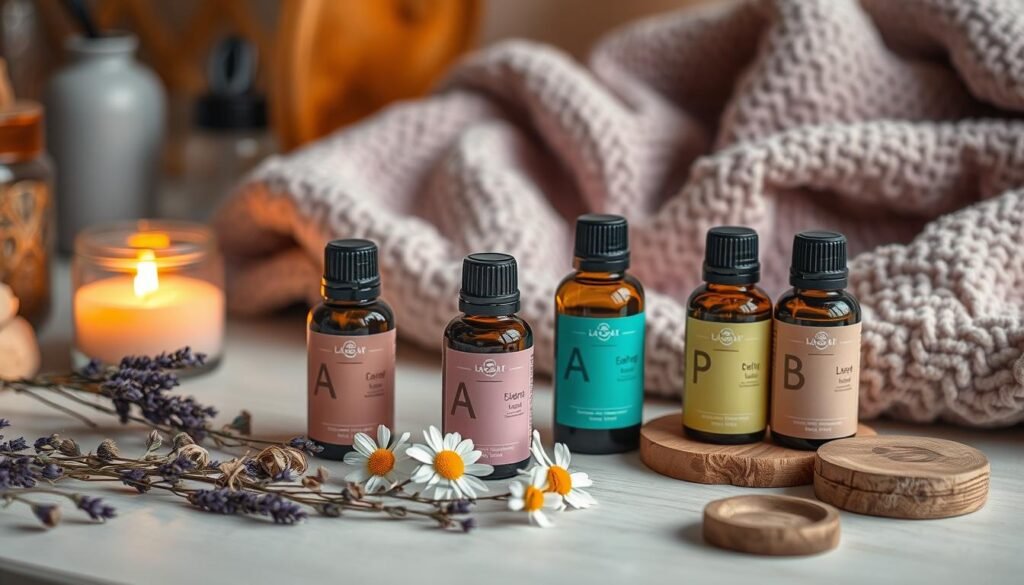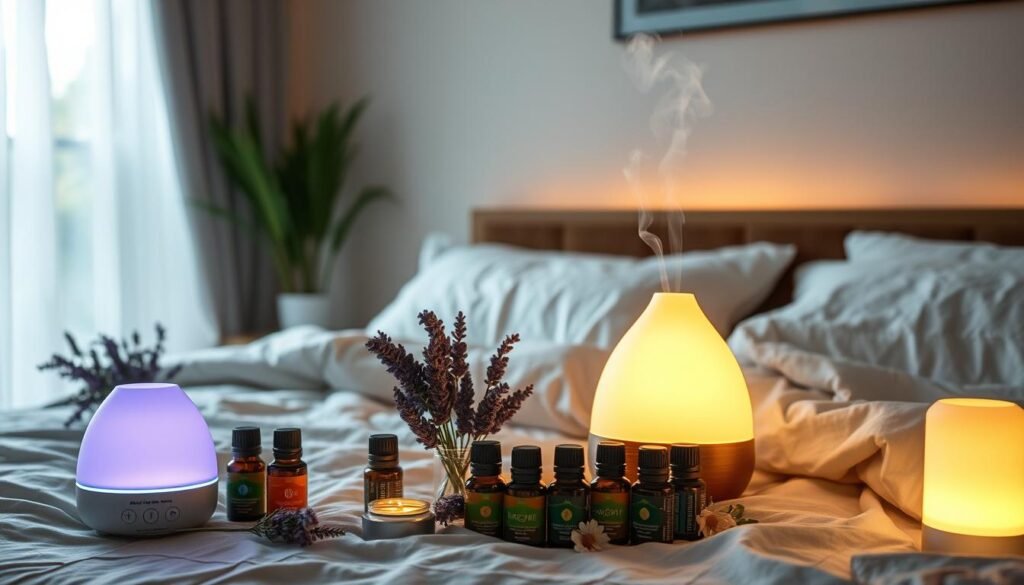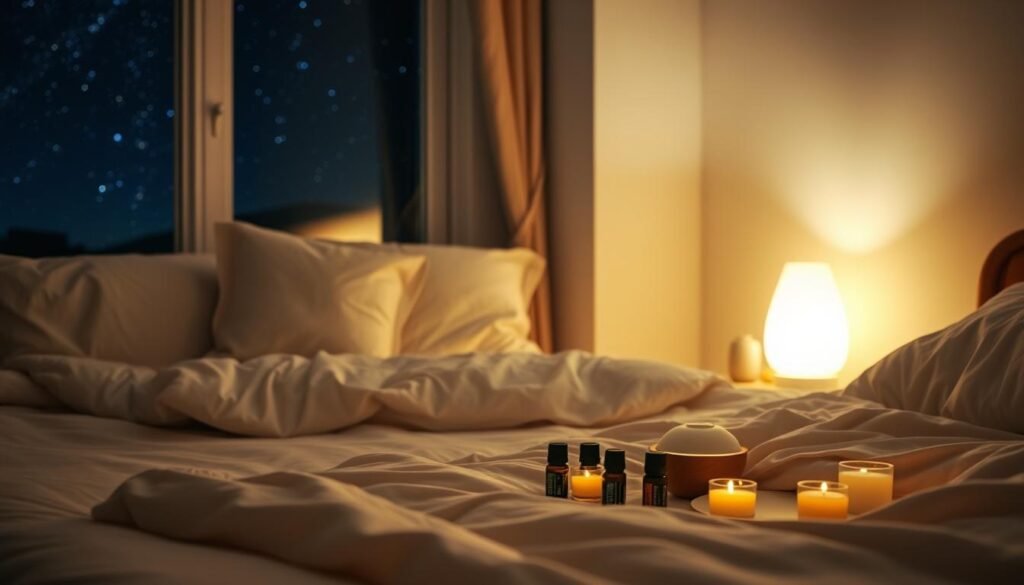Did you know one in three adults in the U.S. experiences insomnia at some point? This fact highlights the need for effective sleep solutions. Many are finding success with natural remedies, such as essential oils. These oils not only smell good. They also help us relax and sleep better. People have used aromatherapy for sleep for hundreds of years. Essential oils are known for their power to make relaxation and better sleep possible.
Lavender is one of these oils, famous for its ability to calm us down. It’s often found in sleep products you can buy without a prescription. As the interest in natural sleep aids grows, so does the search for the best essential oil recipes for insomnia. This guide will cover oils that help us relax, sharing recipes and tips for using them at bedtime. For more on essential oils and sleep, check out the full guide here.
Key Takeaways
- Around one in three adults in the U.S. experience insomnia.
- Natural essential oils can effectively promote relaxation and improve sleep quality.
- Lavender is a popular choice among essential oils, known for its calming effects.
- Aromatherapy for sleep has a long history of therapeutic benefits.
- Creating customized essential oil blends can enhance personal relaxation routines.
- Using essential oils as natural sleep aids is an increasing trend.
- Essential oils like chamomile and bergamot are effective for reducing anxiety and enhancing sleep quality.
Understanding Insomnia and Its Effects
Insomnia makes it hard for people to fall or stay asleep, or they wake up too early. About one in three people will face insomnia at some point. It takes a toll on your mind and body, causing problems like poor daily functioning and big mood swings.
Sleep is crucial for fixing body tissues and controlling hormones. Not sleeping enough messes up these tasks. This leads to bad mood, weaker thinking abilities, and a less effective immune system. Not getting enough sleep can also make stress and anxiety worse.
Looking into natural remedies for insomnia can help those trying to sleep better. Essential oils, for instance, have helped. Lavender, cedarwood, and juniper berry can calm the mind. This can make sleep deeper and more healing.
Understanding how lack of sleep affects us is the first step to getting better rest. Taking steps to sleep better can improve your health and life. Knowing and acting on these tips are key to sleeping well.
Benefits of Using Natural Sleep Aids
There’s a big rise in using natural sleep aids today. People are seeing they’re just as good as usual meds. Many are trying essential oils and finding they help sleep without causing dependency. Research found that almost 2 in 3 American adults have tried melatonin for better sleep. This shows a move towards natural sleep solutions.
Choosing essential oils over drugs is key. Drugs often bring many side effects, while natural options like valerian and lavender are milder. Valerian root is well-known for improving sleep. Studies say taking 300 to 600 milligrams before bed can help a lot.
Using calming scents can also make a big difference. Lavender scent, for example, is proven to help people sleep better. Also, taking magnesium can shorten the time it takes to fall asleep. It’s even been shown to work better than a placebo.
To wrap it up, natural sleep aids like essential oils have many pros. They’re a great choice for better sleep naturally. They help make a calming sleep environment and have fewer bad side effects. This means you get a better night’s sleep.
Essential Oil Recipe for Insomnia
A perfect essential oil blend can really improve sleep quality. It not only promotes relaxation but also helps with insomnia. Below, you’ll find easy recipes and instructions for a bedtime oil diffuser. This is designed to make your nighttime routine better.
Ingredients for the Best Blends
Choosing the right ingredients is key for a calming essential oil blend. Here are the essential oils you need:
- Lavender: Known for its sleep-promoting properties.
- Chamomile (Roman): It’s gentle and soothing, great for everyone.
- Sweet Marjoram: Perfect for insomnia and calming your mind.
- Frankincense: Helps with meditation and relaxation.
- Bergamot: Great for lessening stress and boosting positivity.
- Ylang Ylang: Provides sweet, floral notes for calmness.
How to Prepare Your Essential Oil Blend
Preparing your essential oil blend the right way is crucial. Here are the steps for making your bedtime diffuse:
- Start with a clean glass container or diffuser.
- Combine these oils for a great mix:
- 15 drops of Lavender
- 10 drops of Chamomile
- 5 drops of Sweet Marjoram
- Add 2 tablespoons of a carrier oil, like coconut or jojoba.
- Mix well and pour into your diffuser.
- Use it about 30 minutes before bed for the best effects.
This easy method of making essential oil blends can lead to peaceful and restful nights.
Top Essential Oils for Better Sleep
Exploring sleep-inducing essential oils can make your night better. They help you relax for a peaceful sleep. Each oil has its own way to boost your sleep quality.
Lavender: The Calming Powerhouse
Lavender essential oil is known for its many benefits. It helps soothe people like students and new moms. It’s popular for making deep sleep longer, so many choose it for improved sleep. Lavender oil also lowers anxiety and helps you relax more.
Bergamot: Reducing Stress and Anxiety
Bergamot essential oil is great for anxiety. A study found it, mixed with sandalwood, helped 64% of people sleep better. Its uplifting effect also lessens stress at bedtime. Using bergamot as part of your nighttime routine can be very helpful.
Chamomile: A Gentle Relaxant
Chamomile essential oil is known for its calming scent. Research shows it helps college students sleep better. Its soothing effect is versatile, from sniffing it directly to massage oil use. It lets people choose how they enjoy it.

Picking the right essential oil can change your sleep for the better. Lavender, bergamot, and chamomile are top for relaxation. Make sure to check for allergies and personal likes before choosing. Adding these oils to your lifestyle can enhance their benefits. Learn how to sleep better with this guide or find out more on beating insomnia with these techniques.
DIY Essential Oil Blends for Restful Nights
Making your own sleep-enhancing oil blends can be both fun and rewarding. You can pick and choose ingredients that suit your taste and help you relax. Here are some easy-to-make recipes for a peaceful night’s sleep.
Sweet Dreams Blend
This mix combines soothing scents to help you relax. Here’s a simple recipe to try:
- 3 drops of lavender essential oil
- 2 drops of sweet marjoram essential oil
Put these oils in a diffuser or on your pillow to help bring sweet dreams.
Tranquil Night Blend
This mix is great for de-stressing before bed:
- 5 drops of eucalyptus essential oil
- 4 drops of peppermint essential oil
- 4 drops of lavender essential oil
Diffuse this blend 30 minutes before bedtime to create a calm space.
Clear the Mind Blend
This recipe is ideal for relaxing and clearing your head:
- 4 drops of frankincense essential oil
- 4 drops of cedarwood essential oil
- 3 drops of Roman chamomile essential oil
- 2 drops of bergamot essential oil
Combine them in a roller with a carrier oil. It’s great for applying on your pulse points.
If you like other methods, here are some different ways to enjoy these blends:
| Product | Recipe | Instructions |
|---|---|---|
| Room Spray | Essential oil blend of your choice | Mix 25-30 drops with witch hazel and water in a spray bottle. |
| Essential Oil Roller | Essential oil blend of your choice | Combine 25-30 drops with a carrier oil in a roller ball. |
| VOS’s Sleep Tight Aromatherapy Roller | Sandalwood, geranium, sweet marjoram, bergamot | Use it before bedtime to relax. |
These homemade essential oil blends help promote better sleep. Using these scents can greatly improve your sleep experience.
Aromatherapy for Sleep: How It Works
Aromatherapy offers an array of aromatherapy benefits that can help you sleep better. The way scent affects our brains is crucial for relaxation. Scents reach our brain’s emotion center directly. This helps calming aromas improve our mood and sleep.
Many studies show aromatherapy is a good natural sleep solution. Lavender oil is especially good for sleep. It helps people with insomnia, patients, and new mothers sleep better. Also, bergamot and sandalwood oils helped 64% of healthy women with their sleep issues.
A mix of bergamot, lavender, and ylang-ylang oils can make sleep better. This is especially true for heart rehab patients. A blend that includes Roman chamomile helps ICU patients sleep better by lowering anxiety. When nurses smelled chamomile and lavender oils, they felt less anxious, especially with calm music.
Cedarwood oil also boosts sleep quality in young and older people. Using it regularly can make a big difference. Studies say lavender oil increases deep sleep. Natural sleep solutions like these offer a real way to relax more deeply.
| Essential Oil | Target Group | Effectiveness |
|---|---|---|
| Lavender | General, postpartum mothers | Improved sleep quality |
| Bergamot + Sandalwood | Healthy women | Improved sleep in 64% of participants |
| Bergamot + Lavender + Ylang-Ylang | Cardiac rehabilitation patients | Increased sleep quality |
| Roman Chamomile | Intensive care unit patients | Reduced anxiety and improved sleep |
| Cedarwood | Young adults and elderly | Improved sleep quality |

Using Essential Oils Effectively
Knowing the best ways to use essential oils can boost the benefits you get. Let’s look at how to apply essential oils. We’ll focus on diffusing and putting them on the skin to help you sleep better.
Diffusing Essential Oils
Diffusers are key for spreading essential oil scents in a space. Think about the best type for your area. Options include ultrasonic, nebulizing, or heat diffusers.
Here’s how to use a diffuser right:
- Fill the diffuser with the right amount of water.
- Put in 5 to 10 drops of essential oil, as you prefer.
- Turn it on 30 minutes to 1 hour before bedtime to get a soothing environment.
Keep your diffuser clean for it to work well. Cleaning it with vinegar and water gets rid of old oil traces.
Topical Applications
Applying essential oils directly can calm the body. Remember to mix essential oils with a carrier oil. Jojoba or sweet almond oil are good choices. This avoids skin problems and helps your skin soak up the oil.
Good spots for applying essential oils for calm are:
- Wrist and pulse points
- Behind the ears
- Temples and the back of the neck
- Heart area for feeling balanced
For making your own mix, stick to the right dilution rates. You might use 25-30 drops of essential oil with a carrier oil. Put it in a roller bottle for easy use.
Creating a Calming Bedtime Routine
Having a calming bedtime routine is key for better sleep and well-being. Using essential oils is one way to make evenings peaceful. Adding some lifestyle changes can really improve your sleep habits.
Incorporating Aromatherapy into Your Ritual
Adding aromatherapy to your bedtime can help you relax. Oils like lavender and vetiver calm your mind. Diffusing these in the evening makes it easier to sleep.
Try a warm foot soak with Copaiba and PanAway™ oils for more relaxation. This helps you unwind before bed. You can try different oils to find what works best for you.
Combining Lifestyle Changes with Essential Oils
It’s good to pair lifestyle changes with essential oils for bedtime. Cut down on screen time before sleeping. Stretch gently or drink warm herbal tea with Lavender Vitality™ to relax.
Sticking to a sleep schedule helps your body’s clock. Mixing lifestyle changes with aromatherapy leads to peaceful sleep.

| Essential Oil | Benefits | Application Method |
|---|---|---|
| Lavender | Calms anxiety and promotes restful sleep | Diffusion, topical application, or capsule |
| Vetiver | Grounding effect, reduces tension | Diffusion, roller application |
| Copaiba | Soothing for physical tension | Foot soak, topical application |
| PanaWay™ | Provides relief from discomfort | Foot soak, massage |
Mixing aromatherapy with lifestyle changes leads to better sleep. Try different methods to find what helps you relax most.
For more tips on sleep, check out natural sleep aids and home remedies.
Natural Sleep Tonic: Beyond Essential Oils
Exploring natural sleep aids reveals many options besides essential oils. Many people find it hard to sleep well, which can weaken the immune system and raise health risks. So, finding other ways to help sleep can be very important.
Herbal teas are a top pick for natural sleep remedies. Ingredients like chamomile and lavender help calm the mind. Chamomile has a component called chamazulene which helps you sleep, while lavender helps manage stress. Enjoying these teas can make falling asleep easier.
Tinctures and extracts work fast because they’re absorbed quickly. This lets you easily adjust how much you take. For those who don’t like tea, powders are a simple choice. Valerian root and passionflower are top herbal options to enhance sleep and lessen waking up at night.
Combining sleep aids with essential oils makes for a better rest. Lavender oil, for example, improves deep, healing sleep. Using these oils for aromatherapy or on your skin can help create a peaceful sleep environment.
Recent research underscores the need to tackle sleep problems. With 9% to 15% of people worldwide facing insomnia, natural methods are a good alternative to drugs. These options cut down side effects and also improve alertness and reduce stress during the day.
Trying different sleep tonic recipes can improve how well you sleep. Whether it’s mixing herbs or using new supplements, you can find what works best. For a unique blend, check out Liquid Lullaby. It’s a comforting mix of raw and coconut milk with spices.
Conclusion
This article showed the huge benefits of using essential oil recipes to fight insomnia. It showed how natural remedies can make your sleep better. Studies, including systemic reviews on aromatherapy and massage, found essential oils like lavender and chamomile work well.
Living a balanced life is key to beating insomnia. Adding essential oils to a calming bedtime routine helps a lot. It also works well when you make some lifestyle changes. This mix of soothing smells and proven methods leads to better sleep. It’s what many need in today’s busy life.
In the end, people with sleep problems have a new option with aromatherapy, away from usual sleep medicine. Talking about how good essential oils are shows they improve sleep. They offer hope to those looking for natural ways to sleep better.